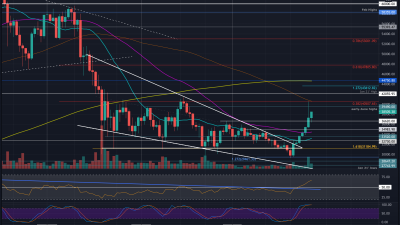
To borrow a line from the film Spinal Tap, the volume on crypto has been turned up to eleven.
The financial industry continues its march towards crypto with Worldpay’s recent announcement that it will expand merchant adoption of cryptocurrency with “pay by crypto” options. Binance also just revealed plans for a new payments processor enabling users to make retail purchases using digital assets, as are LUNU who enable customers to accept crypto payments. Even Warren Buffett is getting in on the action, purchasing $1 billion in shares of Nubank, a Brazilian digital bank focused on crypto.
The fast-growing appearance of crypto in the consumer mainstream is equally remarkable. Advertisements by companies like Coinbase and FTX can now be found throughout sports venues, and the industry staged a veritable takeover of Super Bowl spots earlier this year. Crypto.com purchased the naming rights to the home of the Los Angeles Lakers. Talk of NFTs is seemingly everywhere. And in a nod to the bizarre, hairband legend Dee Snyder is now exploring a lawsuit against Randi Zuckerberg over her crypto-inspired sendup of a classic Twisted Sister tune.
So Who’s Buying, Selling and Holding Anyway?
At the root of all of this is one common theme: increased consumer interest in crypto. A Cornerstone Advisors survey found that of consumers who already hold crypto, 60% of them would “definitely” use their bank to invest in cryptocurrencies. Further, a PYMNTS.com report found that 78% of millennial and 82% of Gen Z crypto owners are interested in using it to make contactless purchases.
Not only are consumers ahead of the crypto mainstream adoption curve, but they also have different objectives and varying degrees of crypto savvy. From those who are trading day in and day out with a solid understanding of the landscape; to those who are in it for the long run and investing for the future; and even those who are just getting started. There is a vast opportunity for businesses to stand out as a trusted advisor and leader in the space by meeting their customers where they are with crypto supply and demand.
It’s not a question of “if” for crypto consumers, but rather a question of “when.”
Consumer Expectations Place Demands on Business
The volume and range of consumers engaging in crypto is skyrocketing, and their goals and intentions are equally diverse. This carries vast implications for businesses and requires an enterprise-level strategy for catering to varying customer demands. Businesses and merchants across industries and markets that can provide multiple options for customers to buy and sell will be well-positioned to meet these demands, especially as we continue to see a momentous shift towards contactless transactions.
Key to this strategy is an ability to support liquidity across various digital assets and diversified consumer portfolios. As consumers move to buy, sell and hold multiple types of crypto – including for the use of retail and other everyday digital purchases – exchanges and financial providers must be able to meet their speed, security and pricing expectations.
Designed and built leveraging the success of Ripple’s On-Demand Liquidity solution, Liquidity Hub will check the boxes for businesses seeking to better serve customers and break into the crypto space. Through a single API integration, Liquidity Hub will tap multiple liquidity pools, ensure optimized pricing across a range of digital assets and increase working capital.
Plug-and-Play Platform for Sourcing Digital Assets
Liquidity Hub is a digital asset aggregation platform that leverages smart order routing and advanced algorithms to source optimized prices for a variety of digital assets across multiple liquidity pools, including BTC and ETH.
It will support both trading and treasury use cases to help build multiple new lines of revenue, and unlock a plethora of new avenues for both businesses and financial institutions to remove common barriers to crypto access, deepen engagement and connect with their customers. And it will continue to evolve over time, adding access to tokenized assets, staking and yield farming in the future.
Companies using Liquidity Hub will be able to free up working capital because – unlike most competitive offerings – the platform will offer reduced pre-funding requirements in destination accounts. Ripple will also provide access to additional working capital to help fund business operations.
With one seamless implementation, Liquidity Hub will offer a turnkey solution that makes it quick and easy for companies to get up and running and have the ability to buy, sell and hold crypto for their customers. Ongoing operations will be simple and intuitive with an all-in-one, enterprise-grade dashboard for managing, trading and reporting functions that streamline the user experience and provide customized reporting options.
Ultimately, Liquidity Hub paves the path to a crypto-first future for business, helping traditional banks, neobanks, fintechs and financial providers around the world – even the infrastructure providers that support them – to quickly and confidently ramp up a crypto offering and cross the finish line ahead of the competition.
Learn more about Ripple Liquidity Hub and how your business can get started today.
The post How Businesses Can Meet Rising Consumer Demand for Crypto appeared first on Ripple.
Go to Source
Author: Team Ripple




